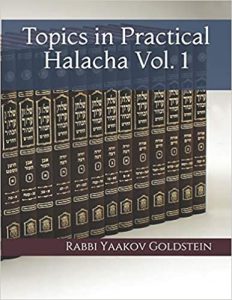
*As an Amazon Associate I earn from qualifying purchases.
The first year:
A. Rejoicing one’s wife during the first year: The verse[1] states that a husband is obligated to rejoice his wife during the first year. This does not mean that he should stay unemployed and spend time in wining and dining with his wife all year long. Rather, it means that he should fulfill her wishes in every way possible, to pleasure her.[2] He is to do for her all those matters that he knows makes her happy. This Mitzvah applies in all areas [and in all times] being it is a body dependent Mitzvah.[3] This Mitzvah applies for all new wives, whether a Besula or widow, although does not apply if one remarries his ex-wife.[4]
B. Traveling from home during the first year:[5] The Torah[6] states that “When one marries a new wife he is not to go to the warfront or do other matters and is to be available to his house for one year and rejoice his wife that he took.” From here we learned the Halacha that Chasan within the year of marriage may not go out to war. Regarding if the Chasan may be away from home [i.e. his wife] for other purposes: Some Poskim[7] rule that the above command is only in reference to leaving his wife to go to war, however a Chasan during the first year may travel away from home for business or other purposes, for his own benefit.[8] Other Poskim[9] however rule it is forbidden for the Chasan to leave his wife during the first year even for business purposes.[10] Even according to the latter opinion, if one’s wife is Mochel [i.e. forgives], one may travel away for business.[11] Likewise, one may travel away from home for the sake of a Mitzvah.[12] [Practically, if it is necessary for one to be away from home and his wife during the first year he should ask for her Mechila/permission. If she is not Mochel, then for a Mitzvah he may travel even without her permission, otherwise a Rav is to be contacted.]
_________________________________________________________________________
[1] Ki Seitzei Devarim 24/5
[2] Aruch Hashulchan 64/4
[3] Yireim Mitzvah 190; See Aruch Hashulchan ibid who casts doubt as to whether this ruling of the Yireim is binding being that it is omitted by all the other Poskim
[4] Aruch Hashulchan ibid
[5] See Pischeiy Teshuvah 64/2; Mishnas Yehoshua 31
[6] Ki Seitzei Devarim 24/5
[7] Radbaz 1/231 based on Semag and Rambam, brought in Pischeiy Teshuvah 64/2; Minchas Chinuch 582; Chasam Sofer E.H. 2/155 “The Chinuch is a Daas Yachid in this matter and the Rambam did not rule this way”; Aruch Hashulchan 64/4 “Some want to say.. there is no source for such a thing”
[8] The reason: As the entire reason why he is not to go to war is because his mind is preoccupied with his wife and he will not fight with all his heart. [See Chasam Sofer E.H. 2/155] Liekwise, traveling for business si considered a Mitzvah. [Chasam Sofer ibid; See Admur 248]
[9] Rambam Sefer Hamitzvos L.S. 311 [According to one Nussach, However see Radbaz ibid and Minchas Chinuch ibid that this is not the correct Nussach]; Sefer Hachinuch Ki Seitzei Mitzvah 582; Likkutei Hapardes; Chochmas Adam 129/19 and Binas Adam 37, brought in Pischeiy Teshuvah 64/2; Kitzur SHU”A 149/13; See Chasam Sofer E.H. 2/155
[10] The reason: As the entire reason why he is not to go to war is in order to spend time with his wife and create a bond with her that will serve to solidify their relationship for all their future years and help build a Bayis Neman Beyisrael. The Torah desired that children be born to a family in where the husband and wife love each other, and this takes a year of development. [Chinuch ibid] Alternatively, just as Hashem stayed with Bnei Yisrael under Har Sinai for a full year after Matan Torah, so too a husband is to act with his wife. [See Rabbeinu Bechayeh Ki Seitzei]
[11] Chochmas Adam ibid, brought in Pischeiy Teshuvah 64/2
[12] Chasam Sofer ibid


 Donate
Donate
Leave A Comment?
You must be logged in to post a comment.